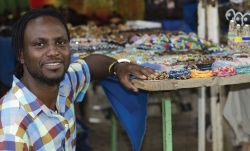
Connecting with Africa:RETOSA connects Africa through Tourism: African small business curio salesman selling ethnic items in Howick, KwaZulu-Natal South Africa RSS Connecting with Africa:RETOSA connects Africa through Tourism2013-05-06 The Regional Tourism Organization of Southern Africa (RETOSA) is a unique example of local, community and regional connections in action. As the body responsible for the Promotion and Marketing of Tourism in the region, RETOSA brings together the 14 diverse countries of Southern Africa â€" Angola, Botswana,
DR Congo, Lesotho, Madagascar, Malawi, Mauritius, Mozambique, Namibia, South Africa, Swaziland, Tanzania, Zambia, Zimbabwe â€" to offer locals and visitors the chance to experience this wonderful continent in all its many natural contrasts and colourful cultures. By combining the full spread of the stakeholder interests within the region â€" both Public and Private, as well as local communities, into one focused organization, RETOSA’s mission is to ensure that the tourism industry becomes the 21st century’s economic driver for SADC through effective development and romotion of the sector. To this end, RETOSA is committed to offering SADC countries the opportunity to create integrated, sustainably developed tourism programs and initiatives which will help drive economic growth, boost job creation and stimulate rapid economic development in rural and peripheral areas. A regionally connected approach will also assist with broader economic development by using Tourism related infrastructure and transport networks as well as increasing lobbying efforts in the transport and communication sector in liberalisation of air transport and development of international hubs to allow direct air access to more destinations within the region. Community-Based Tourism Broadly speaking, ‘Community tourism’ is a type of tourism where the objective is to involve and benefit local communities, especially those from disadvantaged areas. Community tourism is focused on offering sustainable solutions, where local villagers manage the operation communally and share the revenue, collectively. Although there are many different forms of community tourism, the key aim is to ensure that the local community benefit from a fair share of the profits and have a say as to how the tourism itself is run. Within the SADC region, although local communities (small and micro enterprises) are key providers of goods and services to the tourism industry, RETOSA believes that often they do not enjoy sufficient benefits from the development of the tourism itself. There there are a number of reasons for this, which RETOSA are committed to addressing: inaccessibility of many rural areas; lack of adequate involvement in the mainstream development of tourism; less focus on developing servicerelated enterprises (rather than ‘crafts’) for the industry. According to the RETOSA website: “For tourism to be sustainable the tourism sector needs to keep a balance between economic needs and the desire to preserve heritage. There is need for closer liaison with sectors responsible for issues of culture and the environment while bringing communities in SADC into the mainstream tourism business so that economic benefits from tourism also accrue to the communities.†Thanks to its many natural attractions, Africa has always been a favourite tourist destination. However, tourism can also provide a means of interacting with the communities themselves, and not only with nature. For example, Bulungula Lodge in the Eastern Cape is a platform for outsiders to gain access to one of the poorest communities in South Africa. Located on one of the most remote beaches in the country, visitors can spend their time making bricks, stamping corn, brewing beer or catching crayfish. The community of Nqileni village owns 40% of the lodge and is integral to the running of the Lodge. A number of 100% community-owned and run businesses including horseriding, canoeing, fishing, guiding, baking, sewing, cooking, wood-carving and environmental protection projects, have been established at Bulungula. The lodge also assisted the local women in opening (the now legendary) iLanga Fire Restaurant with the best sweet and savoury pancakes in Africa. Other service-related skills have been added to the community’s repertoire, with two women from the village now professionally trained as masseuses and offering pampering full body and Indian head massages to stressed-out tourists. All these community-owned businesses have created jobs and income for 33 families over and above those employed directly at the lodge. Beyond immediate job creation and income generation, the benefits of this type of community-based tourism in Africa is the fact that visitors do a lot more than sightseeing. They actually help a community in need, by participating in daily activities, or sharing their own knowledge and expertise with the people. In this way, tourists can learn from as well as teach the community. Community tourism has become a way of giving back to Africa; an experience that will leave an indelible mark in both the African communities and the tourists, long after they return home. |
Connecting with Africa:RETOSA connects Africa through Tourism
Copyright © 2024 KwaZulu-Natal Top Business